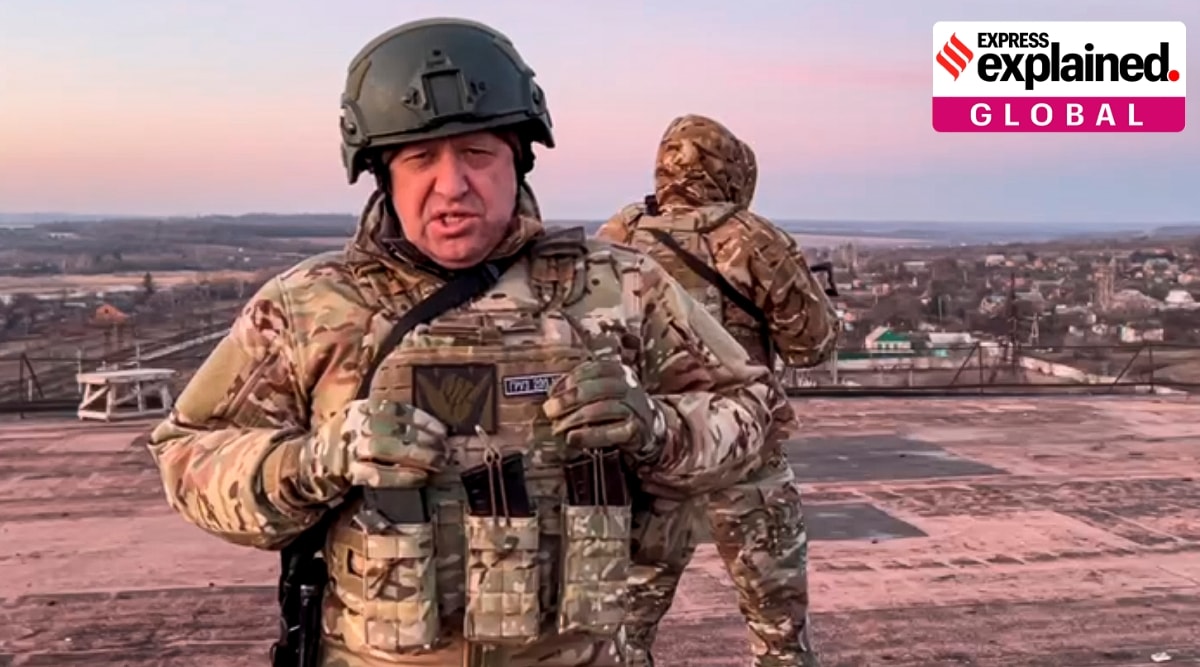Who is Yevgeny Prigozhin, founder of Wagner Group and the man at the centre of the ‘coup’ in Russia?
From being in a Leningrad prison for a decade to becoming “Putin’s chef” and one of the most powerful men in Russia, the rise of Yevgeny Prigozhin has been nothing short of meteoric. Now he is on a warpath against his long time friend and backer.
 Yevgeny Prigozhin's criticism of the top military brass had been in stark contrast with more than two decades of rigidly controlled rule by President Vladimir Putin without any sign of infighting among his top lieutenants. (Prigozhin Press Service via AP, File)
Yevgeny Prigozhin's criticism of the top military brass had been in stark contrast with more than two decades of rigidly controlled rule by President Vladimir Putin without any sign of infighting among his top lieutenants. (Prigozhin Press Service via AP, File) Wagner Group, and its founder and leader Yevgeny Prigozhin find themselves at the centre of a so-called “coup” in Russia.
Russian President Vladimir Putin said in an emergency televised address on Saturday (June 24) that an “armed mutiny” by the Wagner Group mercenary force was treason, and that anyone who had taken up arms against the Russian military would be punished.
A Russian security source had previously told Reuters that Wagner Group mercenary fighters had taken control of all military facilities in the city of Voronezh, around 500 km south of Moscow. As per Prigozhin himself, his mercenaries also have control over the city of Rostove-on-Don, approximately 1,100km south of Moscow.
Prigozhin claimed on Saturday that his Wagner fighters had crossed the border into Russia from Ukraine and were prepared to go “all the way” against Moscow’s military, accusing Russia’s military leadership of killing a huge number of his troops in an air strike.
So, who is Yevgeny Prigozhin and how did he end up taking the world’s largest nuclear superpower?
A decade in prison, a hot dog joint and a swift rise
Born on June 1, 1961, in Leningrad, USSR (now St Petersburg, Russia), Yevgeny Prigozhin is one of Russia’s richest and most influential men.
Prior to his rise as a businessman, however, Prigozhin reportedly spent a decade in prison. As per The Guardian, he was implicated in a number of robberies in early 1980, while still a teen, and sentenced to 13 years in prison. He would get out in 1990, as the Soviet Union verged on collapse.
Realising that everything was about to change, Prigozhin started his business – initially as modest hot dog seller in St Petersburg. According to The Guardian, from the very early days, Prigozhin had an eye on bigger things and in no time, he was involved in a number of ventures, from supermarkets to restaurants.
Finally, in 1995, he established a network of restaurants and catering companies, including the well-known St Petersburg-based company called Concord Catering. In the fertile economic environment of post-Soviet Russia, there was a lot of scope to make money in the booming food services industry, introducing to Russians, luxuries they had been denied in the erstwhile communist regime.
Soon, Yevgeny Prigozhin was one of the wealthiest individuals in the country.
Making friends in high places
As Prigozhin’s business grew, so did his proximity to the Russian ruling class. Concord Catering became extremely popular with various Russian government entities, including the military. Prigozhin himself was a man who knew how to “deal” with people in power.
“He can adapt to please any person if he needs something from them. That is definitely one of his talents,” a businessman who knew him at the time told The Guardian. By the time Vladimir Putin came to power in 2001, Prigozhin was the caterer of choice for Russia’s rich and powerful.
 Yevgeny Prigozhin (left) serves food to Russian leader Vladimir Putin during a 2011 dinner at Prigozhin’s restaurant outside Moscow. (AP Photo)
Yevgeny Prigozhin (left) serves food to Russian leader Vladimir Putin during a 2011 dinner at Prigozhin’s restaurant outside Moscow. (AP Photo)
Whenever Putin would host someone important, for instance, George Bush or Prince Charles, Prigozhin would be the one to provide catering. In fact, old photos of Putin’s meeting with dignitaries often show Prigozhin in the background, unobtrusive, yet ever-present. Prigozhin always provided exquisite service and with his talent to woo politicians, he soon developed a friendship with Vladimir Putin – a friendship that proved to be extremely fruitful for both men.
Prigozhin was routinely favoured for big government contracts. For instance, in 2012, he won more than 10.5bn roubles (£200m) of contracts to provide food to Moscow’s schools, The Guardian reported. However, despite the riches that the food industry brought him, in 2014, he diversified into a new sector – the private military.
Invasion of Crimea and the Wagner Group
It is unclear whose idea was it to form the Wagner Group – whether Putin asked Prigozhin for help, or the latter pitched it to him. Either way, the group came into existence during Russia’s 2014 invasion of Crimea. Wagner Group troops coordinated with Russian armed forces but remained distinct from them. Notably, Prigozhin denied any links to the group till as recently as early 2022.
While private militaries were (and still are) officially banned in Russia, Putin’s need for plausible deniability during the 2014 invasion meant that the Wagner Group troops operated with impunity, taking on the most controversial of tasks, where the involvement of Russian regulars might have been dicey.
After the capturing Crimea, Wagner’s private military contractors (PMCs) were sent to Donbas in Eastern Ukraine, where they assisted pro-Russian separatist forces of the self-declared Donetsk and Luhansk People’s Republics from 2014 to 2015. Wagner’s success in these early operations led to the group’s swift expansion – Wagner became a proxy army for Putin, intervening in places where Russia wanted to intervene but officially could not. And Yevgeny Prigozhin was its general.
Syria, Wagner’s global expansion, and “bot farms”
Late in 2015, Putin decided to intervene militarily in Syria to support Bashar al-Assad during the bloody and highly complicated civil war. Prigozhin won contracts for food and supplies, and also dispatched his Wagner troops there.
It was Wagner, rather than Russian regulars, that saw some of the most intense fightings in the country, and while it took extremely heavy losses, it has been credited by observers as the reason behind the success of Russia’s intervention. It was also in Syria that the first accusations of war crimes were made against the group. In one incident, men linked to Wagner were captured on video beheading and dismembering a Syrian man, The Guardian reported.
Subsequently, Wagner Group PMCs began to be involved in almost every conflict in the world where Russia had a role to play, from civil wars in Sudan and Libya in Africa to Venezuela, during the presidential crisis of 2019.
Simultaneously, Prigozhin was also active back in Russia, reportedly setting up a number of “bot farms” to boost Kremlin talking points the world over. Robert Mueller’s investigation into Russian interference in the 2016 US election alleged Prigozhin and companies linked to him were behind a network of pro-Donald Trump Facebook and Twitter profiles, apparently a part of Russian efforts to boost Trump’s candidacy.
In a statement last year, Prigozhin appeared to admit to this interference, saying “Gentlemen, we interfered, we interfere and we will interfere. Carefully, precisely, surgically and in our own way, as we know how. During our pinpoint operations, we will remove both kidneys and the liver at once.”
Russia’s 2022 Ukraine Invasion
Thus, when Putin decided to invade Ukraine in 2022, Prigozhin and his Wagner Group were at the heart of Russian operations. As the Russian advance stalled, the Wagner’s manpower became increasingly important.
Prigozhin himself stopped denying links to the company and became an active recruiter and spokesperson for the Group. A viral video in 2022 showed Prigozhin inside a prison, recruiting convicts to fight the war in Ukraine. In the video, Prigozhin told the prisoners they would probably die at the front. But if they survived for six months, they would be released with a full pardon and paid generously.
Wagner Group suddenly expanded significantly, with an influx of convict fighters. It has seen some of the heaviest fighting during the ongoing conflict and has suffered massive casualties in it.
Things turn sour
Last month the group seized the eastern Ukrainian city of Bakhmut after some of the war’s most brutal fighting. During the onslaught, however, Prigozhin broke the taboos of Putin’s tightly controlled political system with foul-mouthed insults to Moscow’s top brass. After the capture of the city, he issued a video thanking the Kremlin but also ranted about the alleged treachery of Putin’s top brass, in particular Defence Minister Sergei Shoigu and Chief of the General Staff Valery Gerasimov.
Over the past few months, Prigozhin has criticised Russia’s military leadership for not caring about his troops and using them as cannon fodder. In a viral video released on May 5, he showed a field of dead Wagner mercenaries who he said had perished due to a lack of munitions caused by decisions made by Shoigu and Gerasimov.
This brings us to the present. While tensions had persisted between Prigozhin and the Russian military brass for a while, this is a new low with Prigozhin turning against his long-time backers.
For the latest updates, click here.
- 01
- 02
- 03
- 04
- 05






































